QR Code in South Korea: Branded and Countrywide Use Cases
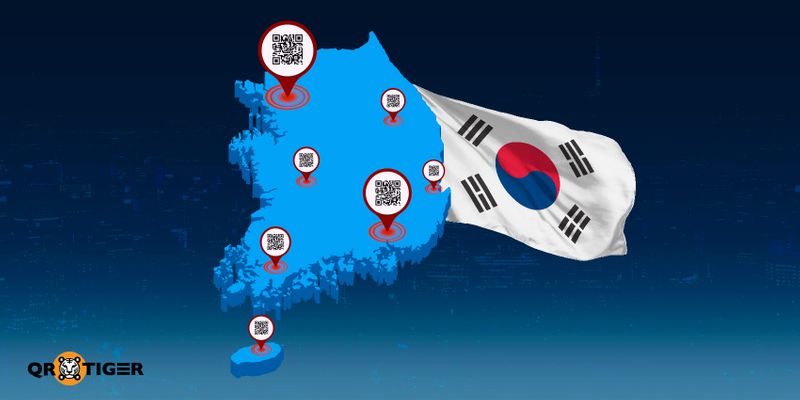
The story of QR codes in South Korea is one of daily life, where scanning has become second nature in a fast-paced, mobile-first culture.
Quick-response codes are a part of the mobile-first strategy in South Korea, where speed and simplicity define how people shop, pay, and engage.
Their existence is reshaping customer experiences in one of the world’s most connected economies. Simple scans are changing the way people connect and interact across industries.
This blog takes a closer look at the trends behind this digital shift in South Korea and what they mean for businesses.
Table of Contents
QR code adoption in South Korea: A timeline
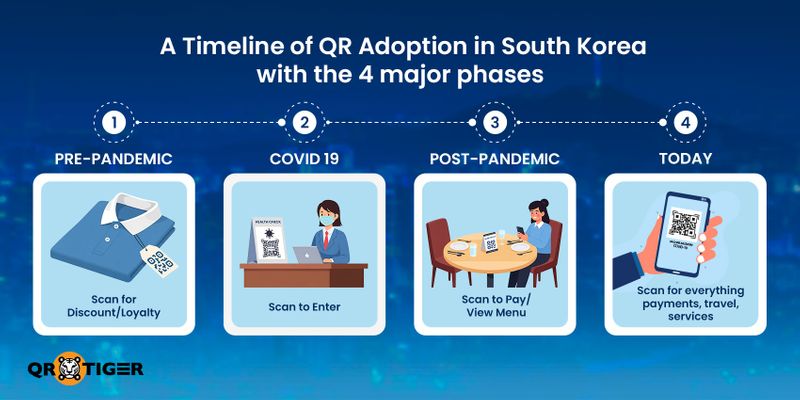
South Korea’s rapid digital transformation has made it one of the most connected nations in the world. According to recent QR code statistics and reports, usage has surged across sectors, making scanning a routine part of daily life.
With near-universal smartphone use and a strong preference for digital transactions, QR code adoption in South Korea ranks among the highest in Asia. Their use reflects the country’s strong digital infrastructure and everyday tech adoption.
Pre-pandemic
Before the COVID-19 pandemic, QR codes were mostly used in retail, marketing, and public services in South Korea.
Shoppers commonly scan them for discounts, loyalty rewards, and quick access to product details, while businesses use them to boost engagement and simplify operations.
These early uses made QR codes familiar and convenient, setting the stage for their rapid expansion.
Moreover, nearly 97% of the population is online, supporting widespread engagement across industries.
This digital readiness made South Korea QR code adoption fast and seamless.
COVID-19 pandemic
Throughout the COVID-19 pandemic, the Republic of Korea made QR code check-ins mandatory at restaurants, malls, gyms, and other public venues.
This pandemic-driven QR adoption enabled real-time contact tracing and played a key role in limiting virus spread.
The government also launched the Q-CODE system for travelers to quickly submit health data and quarantine information before entry. QR codes became central to South Korea’s public health strategy and daily safety measures.
Post-pandemic
After restrictions eased, QR code use quickly adjusted according to the changing demands. Restaurants, shops, and service providers employed them for contactless menus, payments, and promotions.
Government agencies also continued using QR codes to share information and streamline public services, showing that adoption was no longer just about health but also about efficiency.
Today
In 2025, QR codes remain a part of daily life of South Koreans. They use them for shopping, travel, education, and even public services, conveniently accessing payments, information, and apps.
These trends show how QR codes have become an essential part of the nation’s growing digital economy, with tools like a dynamic QR code generator enabling brands to implement innovative and flexible strategies.
🌟Recent barcode statistics project that by 2025, over 29 percent of smartphone users, or roughly 2 billion people worldwide, will use QR codes for contactless payments.
South Korean brands using QR codes
QR codes are no longer a tech novelty; they’re a necessary tool for brands across South Korea. From beauty to entertainment, dynamic QR codes give a strategic advantage to brands, particularly for engaging audiences, tracking interactions, and personalizing experiences.
This list of companies is a direct proof of this, some of which are able to produce QR codes with the help of our QR code software’s tools for personalization, gamification, mobile-first marketing, and advanced analytics.
The Blessed Moon
The Blessed Moon, a direct-to-consumer K-beauty brand, needed a way to engage its audience beyond traditional packaging and promotions. In South Korea’s competitive beauty market, standing out and measuring campaign impact were top priorities.
The brand has been using QR TIGER to create customized QR codes linking customers to products, offers, and interactive content, boosting digital engagement in South Korea while analytics tracked interactions and optimized campaigns.
QR codes boosted interaction and engagement while letting The Blessed Moon personalize marketing and track performance for actionable insights.
K-Star Group
Leading entertainment brand K-Star Group is not immune to the challenge of connecting with a mobile-first, tech-savvy audience. Fans expected instant access to promotions, events, and exclusive content, making standout experiences essential.
Through a targeted QR code marketing campaign in South Korea using QR TIGER’s versatile solutions, fans accessed event tickets, exclusive content, and special offers. Real-time analytics tracked interactions, allowing campaigns to be optimized on the fly.
These efforts boosted fan interaction and content engagement, helping K-Star Group deliver personalized experiences that strengthened loyalty and expanded reach.
Emart
Emart is a popular South Korean brand using QR codes creatively. It made headlines because of its unique “Sunny Sale” campaign featuring 3D shadow QR codes.
Scannable only around midday, the codes offered discounts during off-peak hours, boosting engagement and sales.
Beyond marketing, QR codes streamline contactless payments and reduce checkout friction. By combining convenience with interactivity, Emart enhances customer engagement and encourages repeat visits.
Nongshim
QR codes turn packaging into interactive experiences, linking consumers to recipes, nutrition info, and special offers. Nongshim, a top South Korean food brand, leverages this to boost engagement and brand interaction.
Interactive campaigns provide instant access to videos, contests, and promotions, highlighting QR code usage in retail South Korea while enabling Nongshim to track and optimize results.
Hyundai
Hyundai Motors borrows the power of QR codes in its showrooms and service centers, mainly for automotive and financial services, to let customers access vehicle info, schedules, and promotions.
Digital campaigns powered by dynamic QR codes link users to test drive bookings, special events, or brand storytelling content, creating a seamless bridge between offline and online experiences.
As a well-known multinational automotive manufacturer, Hyundai highlights its role in promoting QR code innovation in Asia.
KakaoPay
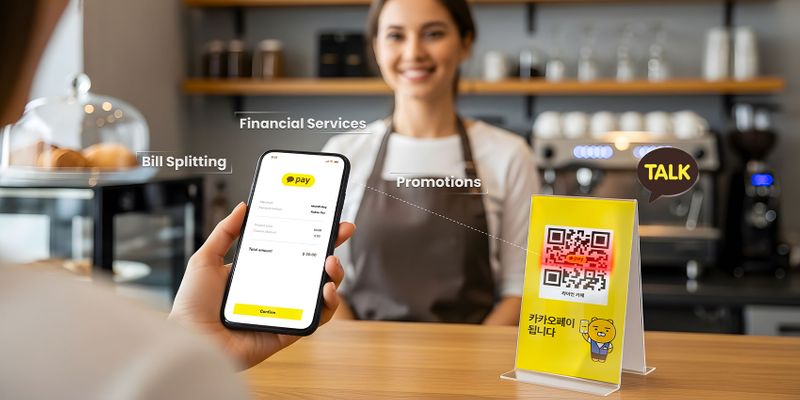
KakaoPay is one of South Korea’s prominent QR code payment platforms, boosted by its integration with KakaoTalk. Users can scan codes in shops, restaurants, and markets for instant, cashless payments.
The platform supports South Korea’s QR code system, using the two-dimensional barcode for promotions, bill splitting, and financial services. Its link to Kakao’s massive ecosystem drives adoption, showing how QR tech grows when tied to apps people already use every day.
Naver Pay
Naver Pay brings QR code payments into South Korea’s largest search and e-commerce platform. Shoppers scan codes to check out quickly online or pay at partner stores offline.
It also uses QR codes for loyalty points, discounts, and rewards, strengthening customer engagement. By linking payments with shopping, Naver Pay highlights the role of QR technology in powering the growing digital economy in South Korea.
Korean Air
Korean Air uses QR codes for boarding, ticketing, and loyalty programs, simplifying the passenger experience. Making a boarding pass or flight update accessible from a PDF to QR code allows travellers to open it immediately when needed.
QR codes also enhance marketing initiatives, connecting passengers to exclusive offers, travel guides, and special campaigns, boosting engagement and customer satisfaction.
Homeplus
Homeplus made headlines in South Korea by turning subway platforms into virtual grocery stores. Commuters could scan QR codes on product images to shop and schedule home delivery, transforming waiting time into shopping time.
The campaign boosted sales and user growth, showing how QR codes can blend convenience with innovation and highlight the pace of 2D barcode technology adoption in South Korea.
Samsung
Samsung has been at the forefront of QR code integration in South Korea, leveraging the technology to enhance user experience across its devices and services.
On Samsung smartphones, QR codes are seamlessly embedded into apps like Samsung Pay, Samsung Health, and Samsung SmartThings, allowing users to quickly access services, make payments, or connect with IoT devices.
By embedding QR code functionality into hardware and software, Samsung has turned a simple scanning tool into a core part of South Korea’s mobile ecosystem, reshaping how people engage with technology.
Outstanding use cases of QR codes in South Korea
QR codes have grown from a retail convenience to a tool supporting payments, tourism, and public services in South Korea.
Yongin Severance Hospital PASS QR code
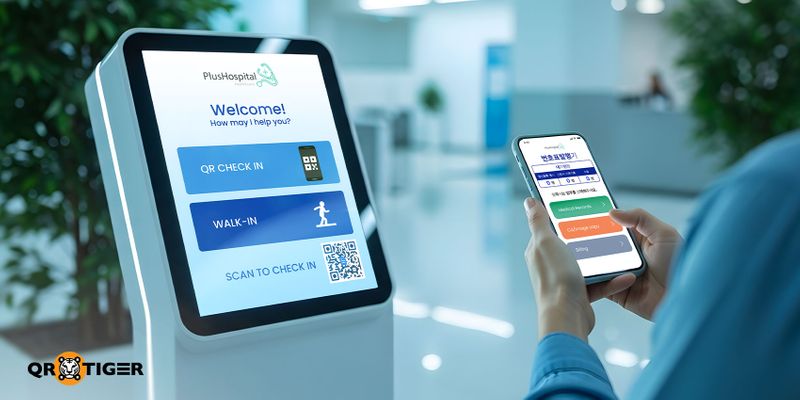
Yongin Severance Hospital, a part of Yonsei University Health System, has implemented QR codes for patient identity verification.
Using the PASS app, a digital ID platform by South Korean telecom providers, patients scan a QR code at hospital kiosks for registration and payments, streamlining check-ins and supporting South Korea’s digital ID initiative.initiative.
With over 10 million users, the PASS QR code system is set to expand into public services and commercial applications, underscoring its growing role in daily life.
QR code-based taxi complaint reporting system
Seoul has implemented a QR code-based reporting system to protect foreign tourists from illegal taxi practices, such as fare overcharging and refusal of passengers.
Tourists can easily report incidents by scanning a QR code on business card-sized leaflets distributed at Incheon and Gimpo International Airports. The system supports multiple languages, including English, Mandarin, and Japanese, making it accessible for international visitors.
Complaints are linked to Seoul’s taxi monitoring system, allowing authorities to enforce fines or suspensions and ensure tourist safety.
Korea electronic arrival card QR code
South Korea has implemented the e-Arrival Card, a mandatory online entry declaration system for foreign travelers.
Travelers must submit personal and travel details via the official website or QR code up to 72 hours before arrival; all foreign nationals must comply, except registered residents, K-ETA holders, and airline crew.
The free e-Arrival Card QR code streamlines entry, supports group submissions, enhances security, and ensures accurate data collection, reflecting South Korea’s commitment to a modern, efficient travel experience.
Q-Code (South Korea QR code)
South Korea’s Q-CODE requires travelers to submit health and travel information online before arrival, generating a QR code to speed up entry and immigration.
As of January 2025, travelers from high-risk regions must complete Q-CODE registration or a health declaration, ensuring a smoother entry and supporting public health.The QR code is valid for a single entry and expires once immigration procedures are completed.
By digitizing health and travel declarations, the Q-CODE system streamlines entry, improves data accuracy, and supports public health, highlighting South Korea’s use of QR codes for efficient and secure travel management.
Cross-border QR code payment
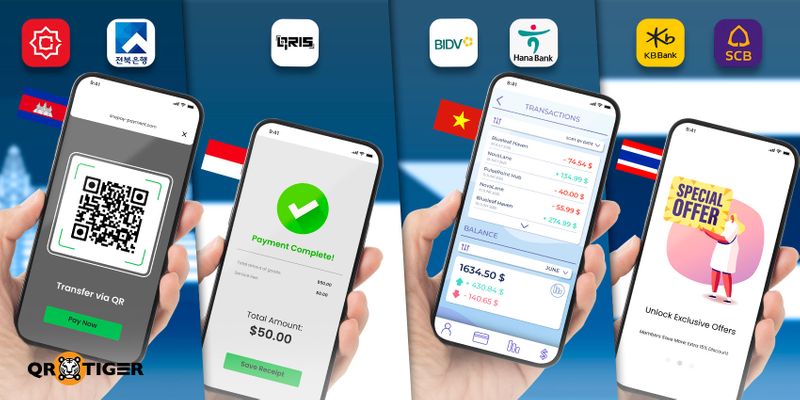
South Korea has partnered with several countries to enable cross-border QR code payments, making transactions easier for travelers.
Partnerships include Cambodia (Bakong system with Jeonbuk Bank), Indonesia (QRIS integration), Vietnam (Hana Bank and BIDV collaboration), and Thailand (KB Kookmin Bank and Siam Commercial Bank).
These initiatives streamline payments, enhance financial connectivity, and reflect South Korea’s commitment to expanding digital payment solutions across Asia.
QR code usage: Lessons from global and local giants in South Korea
Major brands are proving how powerful QR codes can be. SoKor’s QR code adoption led by industry giants enabled fast payments, loyalty programs, and immersive campaigns.
These companies show how a simple scan can evolve into deeper engagement, driving loyalty in the era of digital transformation in South Korea. Their success reflects how QR codes have become central to customer engagement in South Korea’s digital economy.
The benefits of QR codes go beyond convenience. They are capable of:
- Improving customer experience through seamless, contactless interactions;
- Providing better tracking and insights via real-time analytics;
- Scaling campaigns across industries, from retail to travel and beyond;
- Adapting to changing customer demands and industry trends; and
- Smoothly integrating into larger digital and physical campaigns.
This blended approach shows why QR codes remain a powerful driver of growth in South Korea’s digital economy.
Even as some global retailers reconsider older implementations, the technology continues to evolve and thrive in innovative markets like South Korea.
Wrapping up: South Korea’s QR code-driven digital evolution
The South Korea QR code has evolved from a simple convenience tool into a cultural norm, transforming the way people shop, travel, and interact.
Even as newer technologies emerge, they remain a vital part of the nation’s digital economy. For brands, embracing QR codes means staying relevant in a fast-moving, mobile-first market.
The future of QR code usage in South Korea is set to grow stronger with dynamic QR code generator solutions that empower businesses of all sizes to innovate and engage.
Don’t wait. Let your business reach new heights in South Korea and the world by using QR codes today!
FAQs
Is Q-CODE still required in South Korea?
Q-CODE is no longer required for most travelers to South Korea, except those coming from countries designated as “strict quarantine inspection areas.
How to get a Q-Code for South Korea?
You can get a Q-Code by submitting your travel and health information online through South Korea’s official Q-Code portal before your trip.


